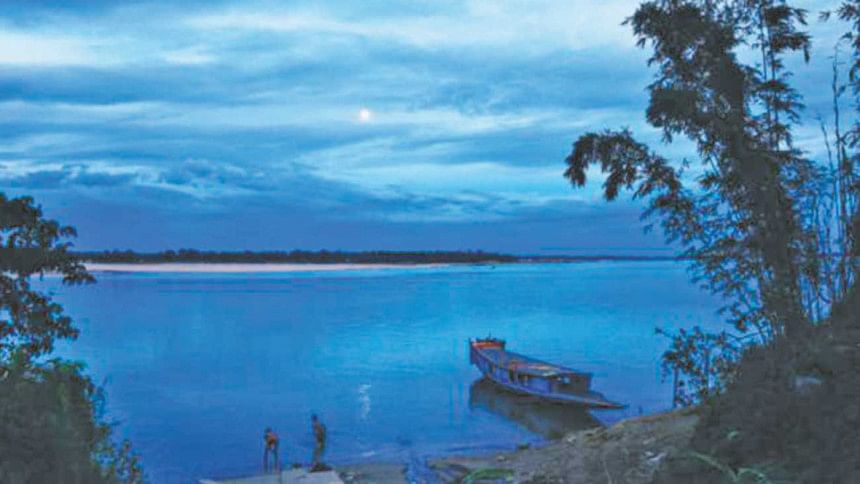Tourism gone wild

Mismanagement, lack of a strategy and enforcement of law are killing tourism in Bangladesh. For example the natural forest of Jaflong is disappearing rapidly due to dumping of stone illegally excavated from the Dawki and Sari rivers by a group of profit mongering traders. No wonder tourism in this scenic hill station, home to subtropical mountains, rainforests, tea gardens and the Khasia ethnic group is on the decline.
Jaflong is not the only place where such man-made problems are impeding the growth of tourism. In Kuakata, the panoramic sea beach in the south-eastern part of Bangladesh, a man set up a bunch of sea-facing stores and leased them out to businesses for a hefty fee. How can this happen in a society governed by law? Who wants to go to a beach to be greeted by a series of ugly looking, shoddily constructed low-lying structures? Will you want to a go to forest to see a pile of stones instead of flora and fauna and listen to the sound of stone crushing instead of the murmur of a river or a bird singing?
The land on which these shops were erected or the rivers from which stones were excavated belong to the republic, not individuals who put a price tag on everything from a mountain to a river. To these purveyors of bottom-line thinking these are mere items on a spread sheet. They are not concerned about the disastrous impacts of destroying nature. The local administration has occasionally seized stone crushing equipment but it is not known if anyone has been punished. Forest department complain that it does not have enough manpower to keep an eye on such illegal activities. That may be true. But the harsh reality is that illegal excavation of stone or sand often takes place, allegedly, with the blessings of locally influential people.
Despite all these constraints—inadequate and poor quality public transports, extended travel time, high-priced but low quality accommodation, lack of recreational facilities—the number of domestic tourists has gone up significantly over the years, now estimated to be about eight million annually. During the long holidays of Eid al Azha alone at least one million people reportedly journeyed to various destinations around the country. What kind of services do they receive for the money they spend? Then there's the issue of safety. The government has introduced the Tourist Police. But reports of harassment of tourists in destinations around the country are not uncommon in the media.
What if the tourists decided that the best way to dodge all these problems is to head elsewhere? In a way, they already are. During the Eid ul Azha an estimated 1-1.5 lakh people went abroad to spend their holiday. Nowadays, people who can afford to spend more than 50,000 Taka prefer to go to countries such as Thailand, Malaysia and Nepal. Tour operators of these countries offer attractive package deals. We are losing out to them.
Why can't tour operators in this country offer similar deals? "They basically have no role to play," according to Major (Retd) Sk Abu Mahadi, managing director of an eco-tourism company. "People like to plan their tours themselves. They do not want to pay extra to tour operators. And why should they? What extra values can we offer? What kind of facilities are there for recreational activities? For example, there is only one safari park close to Cox's bazaar which is 28 kilometres away in Dulhazari. How many good restaurants, cafes and entertainment centres are there?"
Lack of regulation remains an issue. Taufiq Uddin Ahmed, president of Tour Operators Association of Bangladesh (TOAB) said that hotels jack up their rates in the peak season making their job harder. "In many countries tour operators can buy duty-free or low-duty cars. We do not have that opportunity here," he added.
Parjatan Corporation is the public agency responsible for implementation of tourism projects undertaken by the government. It has built hotels and motels across the country. Many guests, however, give them poor marks for their services. Aparup Chowdhury PhD, the Chairman of Parjatan Corporation said, "We have many limitations. Our buildings are old and our furniture outdated. We have tried to redecorate with used furniture. But can that compete with the amenities provided by luxury hotels?"
Bangladesh Tourism Board, the other tourism-related arm of the government, is responsible for promotional activities, product identification and development, training, awareness building and branding. Taufiq Uddin Ahmed, president of TOAB complained that it does not even have brochures for all the tourist destinations of Bangladesh.
Everyone has their grievances. Akhtaruz Zaman Khan Kabir, CEO of Bangladesh Tourism Board said, "Despite having a budgetary constraint, we publish materials on attractive destinations and themes on a regular basis. We also promote our activities on local TV channels and social media."
All these are major challenges and demand a well defined strategy. Then there is another aspect to mass tourism. What if tourists killed tourism in Bangladesh? In many places including the Sundarbans, people go, cook, eat, and play music on loudspeakers and leave behind huge amount of garbage without the slightest care for environment or local communities.
If tourism has to be sustainable, both the authorities and the tourists will have to be more responsible. Community-based tourism is the only way. It is our constitutional duty to protect and conserve the environment and biodiversity.
The writer is a member of the Editorial Team at The Daily Star.

 For all latest news, follow The Daily Star's Google News channel.
For all latest news, follow The Daily Star's Google News channel. 



Comments